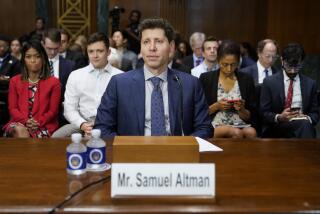Experts Urge Safeguards for Workersâ Genetic Data
WASHINGTON â A prestigious coalition of health experts and ethicists Thursday called for legislation or other measures to protect against abuse of an individualâs genetic information in the workplace--for example, using the data to deny jobs, promotions, insurance coverage or other benefits.
In recent years, rapidly growing technology and other advances have enabled geneticists to find disease-related genes in human DNA and to develop new tests to detect who carries them. At the same time, health officials say that many people who might otherwise benefit from knowing about their inherited risks for certain diseases have chosen to avoid these tests out of fear that such information will be used against them.
âGenetics is giving us our best hope yet of understanding what goes wrong at the most fundamental level when disease occurs,â said Dr. Francis Collins, director of the National Human Genome Research Institute, part of the National Institutes of Health. âBut if people are worried . . , they will be unable to take advantage of the enormous opportunities genetics research offers.â
The recommendations to provide protection against abuse of genetic data were published in todayâs issue of the journal Science and come from experts representing the federal government and the private sector convened to explore the social, ethical and legal ramifications of the research.
The group was organized by the Genome Project, an international research effort to analyze the structure of human DNA and determine the location and makeup of the estimated 100,000 genes in the human body. In the United States, the work is being funded by NIH and the Department of Energy.
Under the groupâs recommendations, employers would be forbidden from using genetic information to affect the status of a worker unless a specific job-related connection to obtaining such information could be proved.
Also, the group recommended that employers be restricted access to genetic information contained in medical records released by individuals in claims filed for reimbursement of health care costs. Such information should be released only with an individualâs written permission, the group said, and violators should be subject to âstrong enforcement mechanisms.â
Generally, the business community has opposed federal efforts to impose workplace policies on the private sector.
Mary Reed of the National Federation of Independent Business, a lobbying group that represents the interests of small businesses, said that she prefers to wait until specific legislation is drafted before commenting on the recommendations. She noted, however, that small businesses--which generally shoulder the economic burden of such federal mandates--traditionally have argued that employers should be free to work out individual arrangements with their employees regarding these kinds of issues.
An example of the expanding use of genetic information in disease detection involves breast and ovarian cancer. Scientists recently discovered that crucial alterations in the genes known as BRCA I and BRCA II are responsible for many of these types of cancer that run in families. A test is now available that can detect the abnormality, and there has been considerable debate over whether women should take it.
Mary Jo Ellis Kahn, an official with the National Breast Cancer Coalition, was among those welcoming the recommendations on use of genetic information.
According to the group convened by the Genome Project, some courts have allowed employers to require the genetic examination of workers or prospective employees, and employers who do not perform tests directly still could have access to an employeeâs medical records. âYet, most observers agree, genetic information should not be used to deny someone a job or a promotion,â the group said in its article.
More to Read
Sign up for Essential California
The most important California stories and recommendations in your inbox every morning.
You may occasionally receive promotional content from the Los Angeles Times.










